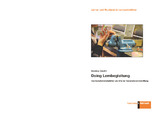Citation link:
http://dx.doi.org/10.25819/ubsi/10050Files in This Item:
| File | Description | Size | Format | |
|---|---|---|---|---|
| Dissertation_Annika_Gruhn.pdf | 3.31 MB | Adobe PDF |  View/Open |
| Dokument Type: | Doctoral Thesis | metadata.dc.title: | Doing Lernbegleitung | Title addition: | Hochschullernwerkstätten als Orte der Generationenvermittlung | Other Titles: | Doing Lernbegleitung | Authors: | Gruhn, Annika | Institute: | Fakultät II (Bildung, Architektur, Künste) | Free keywords: | Lernbegleitung, Ethnografie, Individualisierung, Studierende als Peers | Dewey Decimal Classification: | 370 Erziehung, Schul- und Bildungswesen | GHBS-Clases: | IJI | Issue Date: | 2019 | Publish Date: | 2022 | Source: | Bad Heilbrunn: Klinkhardt, 2021. - 978-3-7815-2487-3 | Abstract: | Die Studie „Doing Lernbegleitung. Hochschullernwerkstätten als Orte der Generationenvermittlung“ wendet sich dem Bereich der sogenannten ersten Phase der Lehrer*innenbildung an deutschen Hochschulen zu. Ausgehend von einer Auseinandersetzung mit den Besonderheiten des Forschungsfelds Hochschullernwerkstatt geht die Studie der Frage nach, wie Studierende des Lehramts im Rahmen des Praxisprojekts „Werkstatt für Kinder“ der Hochschullernwerkstatt OASE an der Universität Siegen mit dem pädagogischen Konzept der Individualisierung bzw. Öffnung und der damit verbundenen Einführung in die Rolle der Lernbegleitung konfrontiert werden: So wird die Umsetzung des konzeptionellen Selbstverständnisses in der sozialen Praxis der OASE Hochschullernwerkstatt fokussiert. Um ethnografisch zu erforschen, wie Lernbegleitung gemacht wird, wird sowohl die Vorbereitung auf die „Werkstatt für Kinder“ innerhalb der studentischen Peer-Gruppe, als auch die Inszenierung von Studierenden als Lernbegleiter*innen für Kinder in den Blick genommen. Durch diesen Zugang können typische Handlungsprobleme aller genannten Akteur*innen und damit verbundene spezifische Spannungsfelder und Konflikte des pädagogischen Settings Hochschullernwerkstatt sukzessive aus einer empirisch begründeten distanziert-analytischen Perspektive heraus beschrieben werden. Die Studie ist von einem sehr persönlichen Zugang zum Feld und damit einer involvierten Forscherinnenposition geprägt, die im Rahmen des Forschungsprozesses als Analysewerkzeug genutzt wird. Die empirischen Ergebnisse werden entsprechend der Entfaltung sozialer Praxis im Feld vorgestellt und anschließend an zwei theoretische Rahmungen, generationale Ordnung und (pädagogische) Räume und Dinge, angebunden. So wird Lernbegleitung als eine spezifische, in der OASE Hochschullernwerkstatt situierte, soziale Praxis rekonstruiert, welche als Herstellung generationaler Ordnung durch die Trias von menschlichen Akteur*innen, Räumen und Dingen beobachtet und beschrieben werden kann. Im Gegensatz zu der normativ aufgeladenen Gegenüberstellung von „traditionellem“ und „alternativem“ pädagogischen Handeln werden mittels dieser theoretischen und analytischen Brille Unterschiede (zum Beispiel zwischen Lehren und Lernbegleitung, aber insbesondere auch zwischen Kindern und Studierenden) nicht als bereits gegeben vorausgesetzt, sondern prozesshaft als Effekt und Medium sozialer Praxis aufgefasst. The study “Doing Lernbegleitung. Hochschullernwerkstätten als Orte der Generationenvermittlung” addresses the so-called first phase of teacher training at German universities. Based on an examination of the special features of the research field of university learning workshops, the study explores the question of how teacher trainees are confronted with the pedagogical concepts of individualization as well as open and informal education. It focuses the introduction to a specific professional understanding of teachers as learning companions within the framework of the practical project “Werkstatt für Kinder” of the university learning workshop OASE at the University of Siegen: Thus, the implementation of the conceptual self-understanding in the social practice will be focused on. In order to ethnographically explore learning companionship as a specific bundle of social practices, both the preparation for the “Werkstatt für Kinder” within the student peer group and the social construction of students as learning companions for children will be examined. This approach allows to successively describe typical challenges of both students and children as well as the associated specific fields of tension and conflicts of the pedagogical setting of the university learning workshop from an empirically based perspective. The study is characterized by a very personal approach to the field and thus an involved researcher position, which is used as an analytical tool in the research process. The empirical results are presented according to the unfolding of social practice in the field and then linked to two theoretical frameworks, generational order as well as (pedagogical) spaces and things. Thus, learning companionship is reconstructed as a bundle of specific social practices situated in the OASE university learning workshop, which can be explored and described as the production of generational order embracing the triad of human actors, spaces and things. This theoretical and analytical perspective challenges the normative understanding contrasting “traditional” and “alternative” pedagogic concepts (for example differences between teaching and learning companionship or between children and students) by describing differences as an effect and medium of social practice. |
Description: | Finanziert aus dem Open-Access-Publikationsfonds der Universität Siegen für Monographien |
DOI: | http://dx.doi.org/10.25819/ubsi/10050 | URN: | urn:nbn:de:hbz:467-21277 | URI: | https://dspace.ub.uni-siegen.de/handle/ubsi/2127 | License: | http://creativecommons.org/licenses/by-nc-nd/4.0/ |
| Appears in Collections: | Geförderte Open-Access-Publikationen Hochschulschriften |
This item is protected by original copyright |
Page view(s)
358
checked on Nov 24, 2024
Download(s)
126
checked on Nov 24, 2024
Google ScholarTM
Check
Altmetric
This item is licensed under a Creative Commons License


